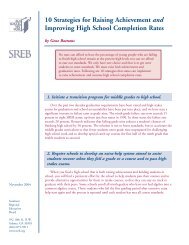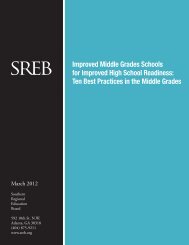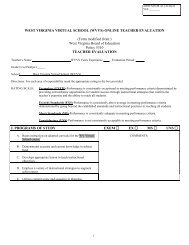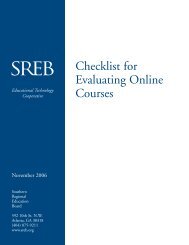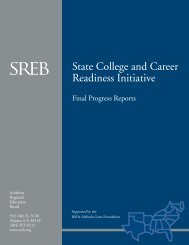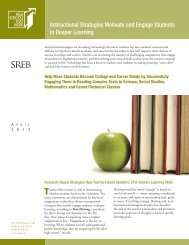<strong>2012</strong>-<strong>2013</strong> <strong>National</strong> Leadership <strong>Development</strong> Series (Continued)NATIONAL LEADERSHIP DEVELOPMENT COURSE DESCRIPTIONS1. Using Root Cause Analysis to Create a High-Performance Learning CultureSchool leaders who are able to uncover the real problems their schools face are more likely toclose performance gaps among student groups.In this course, principals and school leaders will learn to engage individuals and teamsto ask tough questions about which current school practices are limiting studentlearning and to mine a variety of data sources to clearly articulate the scope, cause andpotential resolution of the problem. Participants will learn strategies for improvingstudent learning by creating a school culture that is open to change and innovation andby building shared beliefs among community stakeholders about effort, relevance andrelationships. Using tools to recognize and understand relevant sources of school data,participants identify high-priority areas of concern and create a plan to lead schoolteams in a consistent and relentless focus on data-based solutions.Principals, teacher leaders, curriculum specialists and aspiring leaders can learn from thistraining how to engage individuals and teams to close achievement gaps by identifyingproblems, understanding their root causes and implementing research-based solutionswithin schools. This course raises awareness of issues that adversely impact studentacademic performance and provide the information and tools to assist school leaders inidentifying and solving these “red flag” issues in their schools or organizations.2. Assessing Academic Rigor in School and Classroom PracticesRigor in the school curriculum is one of the top indicators of a student’s potential to graduatefrom high school ready to earn a college degree, and it must be recognized and expected byschool leaders.Academic rigor is the level of cognitive complexity of expected learning. This courseintroduces principals and school leaders to alignment tools to determine levels of rigorand core habits of mind in classroom practices and schools. Participants will assessrigor in lesson plans, unit plans and course content; in teacher assignments and studentwork; in formative and summative assessments and rubrics; and in the tight alignmentof these elements to challenging standards. Participants will undertake a course projectthat focuses on a problem they may be facing in their schools or organizations inrecognizing and infusing rigorous expectations in their instructional and assessmentpractices. By analyzing classroom and schoolwide practices and a variety of strategiesfor improving rigor, including the role of cognitive complexity, high expectationsand grade-level work, participants will develop a plan to increase academic rigorschoolwide.3. Organizing Resources for a Personalized Learning EnvironmentUnderstanding how elements of the school environment (time, space, people and financialresources) impact student achievement is key to shaping the learning environment in waysthat promote student achievement.In this course, principals and school leaders will engage in deep reflection aboutorganizing elements of the learning environment, such as instruction, advisement,extra help, and student and family relationships, all with the goal of motivatingstudents and making learning meaningful for them. School leaders will learn toutilize time, staff, space and financial resources most effectively by addressing theirschools’ most challenging problems and achievement gaps. This course explores valueaddedcommunication and organization strategies and plans that shape the learningenvironment in ways that promote student achievement.In this course, participants will learn how personalizing school can lead to studentengagement in learning, how teachers have the ability to make a difference in studentlives and how learning organizations can have a positive impact on the community. Thereadings, activities and tools provided in the course will help participants apply theseskills in their workplaces. Participants will complete a course project that focuses ondesigning school practices around personalizing the learning environment.4. Designing Assessment to Improve Student LearningAssessment decisions should be related to the purpose of the assessment and the content to betested, and school leaders should set the focus on assessment as a tool to improve instruction.The purpose of this training is to lead participants in re-thinking the way they useassessments in the classroom and in the school as a whole. School leaders should takean active role in designing and implementing assessments that address the needs ofall users of assessment information to promote learning and higher achievement.Information gleaned from the wide variety of student assessments should be usedto guide instructional decisions at all school levels. In this course, participants willlearn the “how and why” of grades and grading, which practices are effective or needto change, and how to convey to all stakeholders the expectation of students’ levelof achievement toward grade-level standards. An emphasis will be placed on thedevelopment of students’ higher-order thinking skills through assessment practices.The goal of this course is to create and lead a process to increase student achievementthrough the use of assessment strategies. Participants will complete a course projectthat focuses on aligning schoolwide assessment practices to standards, curriculum andinstruction and developing solutions to school assessment issues through schoolwidebalanced assessment programs.17
<strong>2012</strong>-<strong>2013</strong> <strong>National</strong> Leadership <strong>Development</strong> Series (Continued)5. Mapping the Curriculum to Grade-Level and College-Readiness StandardsA deeper understanding of learning expectations of national, state, and college- andcareer-readiness standards enables school leaders to apply the standards to practice.In this course, school and district leaders will evaluate standards, prioritize theirvalue, align them to the curriculum and communicate them to teachers and students.Aligning and mapping standards into the curriculum is essential to communicate tostudents and teachers the high level of work expected from all groups of students.Curriculum mapping helps school leaders identify gaps between what is taught andwhat students are expected to learn. The process engages teachers in formulating theessential questions that build 21st-century knowledge and skills and improve theachievement of all students.Course participants will learn the rationale, goals and benefits of prioritizing standardsand aligning their curricula to identified standards. Participants undertake a project tobuild a curriculum map, construct essential questions and create a timeline and planfor monitoring continuous improvement. Participants will demonstrate how to lead ateam through the process and successfully implement a curriculum plan in their schoolor organization.7. Building Instructional Leadership Teams to Lead Change for Student SuccessSchool change can rarely be accomplished alone; it takes leaders empowering teams to createhigh-performing learning systems accountable to all students.This course focuses on forming instructional leadership teams, helping them definetheir purpose and goals, and working collaboratively with them to create a climate forchange based on their school’s needs. Participants will learn about the various humanand organizational factors that impact a school’s ability to implement and sustainmeaningful change. Teams will identify a vision of adaptive change — change that isdeeply rooted in high expectations for all — and work on a framework for sustainableimplementation of these concepts. The skills gained in this training are valuable toindividuals as well as school teams. Participants will undertake a course project thatfocuses on establishing effective teams in their schools or organizations.Through this course, participants will gain an understanding of how shared leadershipand a team approach to school improvement can help sustain improvement processes.Participants will undertake a course project that focuses on establishing effective teamsand using PLCs to lead a change initiative and build leadership capacity throughoutthe school.6. Leading Schoolwide Literacy InitiativesFor instruction to be effective, leaders must spend time developing their faculty’sunderstanding of literacy instruction and awareness of their students’ cultures, backgroundsand experiences.This course makes the case that literacy is everyone’s job. Leaders will learn theimportance of teaching all content areas through strategies that help students getthe most from written and spoken words. Participants will investigate a wide varietyof research-driven strategies that help students become better learners of standardsbasedcontent, and learn about differentiating the literacy needs of each student. Thedevelopment and implementation of a schoolwide literacy plan are central to the course.Approaches that promote literacy in all areas of instruction are modeled throughout, andparticipants incorporate their learning into practice by completing a course project todesign schoolwide literacy initiatives across disciplines and grade levels in their schools.18Through this course, participants will lead the process of increasing studentachievement through the use of strategies that promote literacy in their schools.Participants will develop a deeper understanding of literacy, examine root causesof literacy problems in their schools, evaluate solutions through successful literacyprograms, and develop a plan to address literacy needs, including a focused andsustained professional development plan to reach their literacy objectives.







